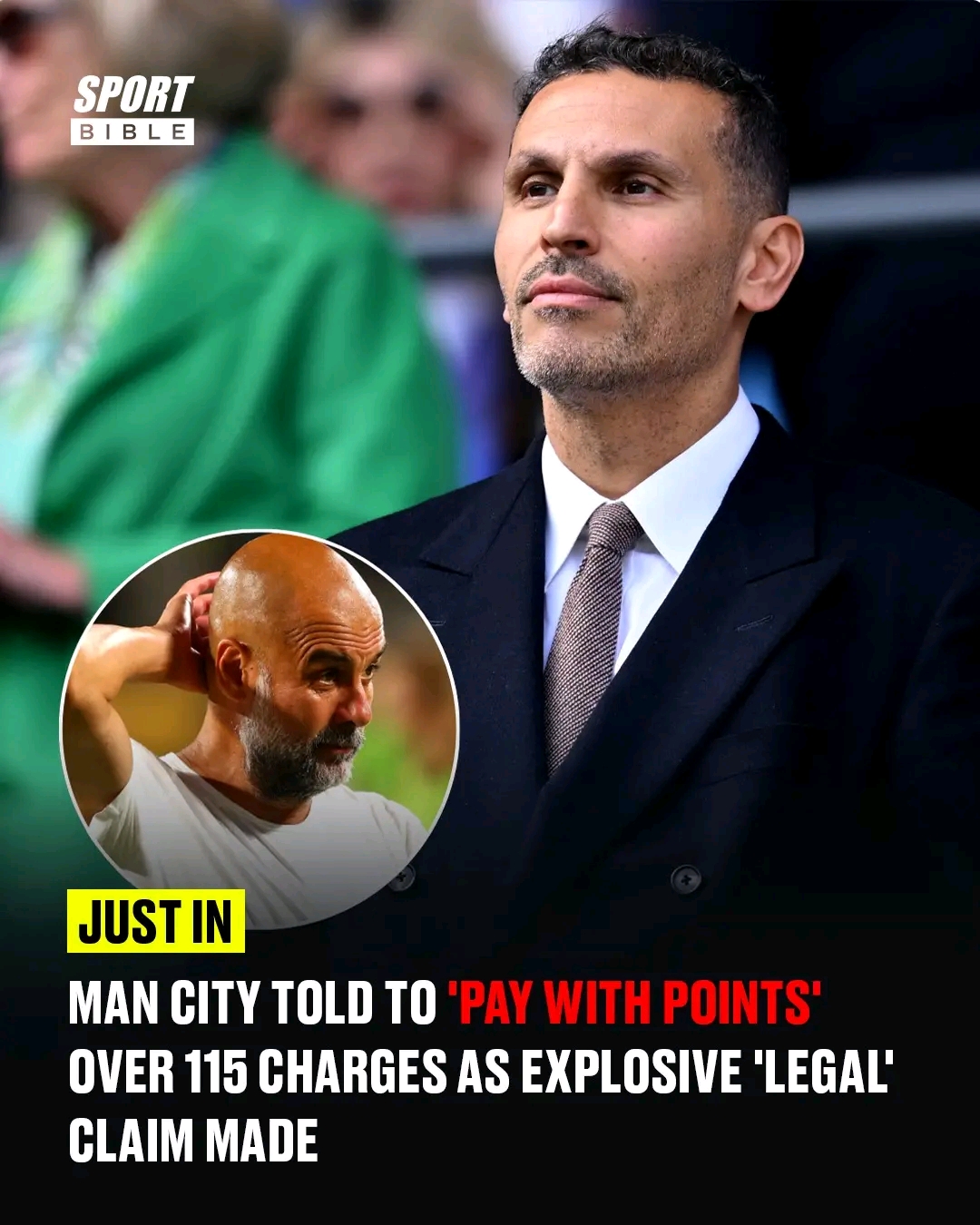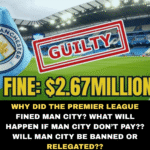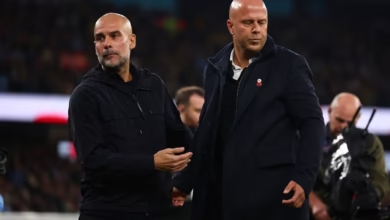Man City told to ‘pay with points’ over 115 charges as explosive ‘legal’ claim made

The world of English football finds itself embroiled in one of the most significant regulatory battles in Premier League history, as Manchester City faces 115 charges related to alleged Financial Fair Play (FFP) violations. At the center of this controversy stands Jose Mourinho, the outspoken Portuguese manager who has consistently maintained that his Manchester United side should have been awarded the 2017/18 Premier League title, should City be found guilty of the charges against them.
In February 2023, the Premier League delivered what many consider to be the most comprehensive set of charges ever leveled against a top-flight English club. Manchester City stands accused of 115 separate breaches of financial regulations spanning a nine-year period, fundamentally challenging the integrity of their recent success and raising questions about the legitimacy of their four consecutive Premier League titles.
The charges center around allegations that City failed to provide accurate financial information to the Premier League, potentially disguising the true nature of their revenue streams and expenditure. These accusations strike at the heart of modern football’s regulatory framework, which was designed to prevent clubs from gaining unfair competitive advantages through excessive spending beyond their means.
Manchester City has vehemently denied all wrongdoing, with the club’s leadership maintaining they possess what they describe as an “irrefutable body of evidence” that will vindicate their position. This defensive stance has set the stage for what promises to be one of the most closely watched legal proceedings in sporting history, with implications that extend far beyond the confines of the Etihad Stadium
Jose Mourinho’s involvement in this narrative extends beyond mere commentary; it represents a deeply personal grievance rooted in his belief that his achievements at Manchester United have been unfairly overshadowed. The Portuguese manager, known for his tactical acumen and provocative statements, has repeatedly characterized his ability to guide United to second place in the 2017/18 season as one of his greatest managerial accomplishments.
During a recent interview with Canal 11, Mourinho articulated his position with characteristic directness, stating his belief that clubs found guilty of FFP violations should “pay in points” rather than through financial penalties. This perspective reflects a growing sentiment within football circles that monetary fines are insufficient deterrents for wealthy clubs that can absorb such costs as merely the price of doing business.
Mourinho’s argument gains particular poignancy when viewed through the lens of Manchester United’s performance during the 2017/18 campaign. Despite facing significant internal challenges following the departures of Sir Alex Ferguson and David Gill, Mourinho managed to secure a second-place finish with 81 points, finishing 19 points behind Pep Guardiola’s Manchester City, who accumulated 100 points in what many considered a near-perfect season.
The Portuguese manager’s assertion that “legally, we should have won the league” if City is found guilty represents more than mere speculation; it reflects his genuine belief that his tactical approach and team management during that season deserved greater recognition. His comments about the instability at United during that period provide context for what he views as an extraordinary achievement given the circumstances.
Mourinho’s call for point deductions rather than financial penalties highlights a fundamental flaw in current FFP enforcement mechanisms. Wealthy clubs, particularly those backed by sovereign wealth funds or billionaire owners, can often absorb financial penalties without significant impact on their operations. This reality has led to growing calls for more meaningful sanctions that directly affect competitive performance.
The concept of retrospective point deductions or title stripping represents a nuclear option in football governance, one that leagues have historically been reluctant to employ due to its far-reaching consequences. However, the scale and alleged systematic nature of City’s purported violations may necessitate unprecedented action if the charges are proven.
Such measures would not only affect Manchester City but could fundamentally alter the historical record of English football. The 2017/18 season, in particular, would be transformed from City’s centurion campaign into a cautionary tale about the consequences of regulatory violations. This potential shift in narrative explains Mourinho’s continued advocacy for his United side’s rightful recognition.
The complexity of Manchester City’s case cannot be overstated. The 115 charges encompass a wide range of alleged violations, from failure to provide accurate financial information to potential breaches of UEFA’s FFP regulations during the period in question. Each charge requires detailed examination of financial records, contractual arrangements, and corporate governance structures.
A private hearing was conducted in December, reflecting the sensitive nature of the commercial and legal information involved. The confidential nature of these proceedings has only intensified speculation about potential outcomes, with various scenarios being discussed throughout the football community. The delay in reaching a verdict underscores the thoroughness required in examining such complex allegations.
The legal implications extend beyond sporting sanctions. If found guilty, Manchester City could face challenges to their commercial partnerships, potential civil litigation from competitors, and reputational damage that could affect future revenue streams. The club’s insistence on their innocence suggests they view the stakes as existential, not merely regulatory.
While retrospective title stripping remains rare in English football, international precedents exist that demonstrate the willingness of governing bodies to take drastic action when faced with serious regulatory violations. Juventus’s experience in Italian football, where they were stripped of titles and relegated following the Calciopoli scandal, provides a template for the kind of comprehensive sanctions that could theoretically be applied.
However, the Premier League operates within a different legal and commercial framework than other leagues, with considerations including broadcast agreements, commercial partnerships, and the global nature of the competition complicating any potential sanctions. The league’s reputation as a premium product depends partly on the perception of fair competition, creating pressure to take decisive action if violations are proven.
Mourinho’s reference to his upcoming Netflix documentary suggests he views this period as historically significant, worthy of detailed examination. His comments about the “critical moment” at United following the departures of Ferguson and Gill provide context for his achievement in securing second place, particularly if it ultimately proves to have been first place by default.
The 2017/18 Premier League season represented a high-water mark for Manchester City under Pep Guardiola, with the team setting multiple records including most points in a season, most wins, best goal difference, and most consecutive victories. This dominant performance came during Mourinho’s second season at United, a period when the Portuguese manager was attempting to rebuild the club’s competitive standing.
United’s second-place finish with 81 points represented their highest total since Ferguson’s final season, achieved despite what Mourinho characterizes as significant internal challenges. The gap between City and the rest of the league that season was substantial, with third-place Tottenham finishing 23 points behind City and 4 points behind United.
If City were to be stripped of that title, it would fundamentally alter the narrative surrounding both clubs during that period. Mourinho’s achievement would be elevated from a creditable second place to a title-winning campaign, while City’s record-breaking season would become a cautionary tale about the consequences of regulatory violations.
As of July 2025, the football world continues to await the verdict in Manchester City’s case. The prolonged nature of the proceedings reflects both the complexity of the charges and the significance of the potential consequences. Mourinho’s continued commentary ensures that the debate remains in the public consciousness, maintaining pressure on regulatory authorities to reach a definitive conclusion.
The case has broader implications for the future of financial regulation in football. A strong verdict against City, involving significant sporting sanctions, would send a clear message about the consequences of FFP violations. Conversely, a verdict favorable to City might be interpreted as validation of their approach and could influence how other clubs structure their financial arrangements.
For Mourinho personally, the outcome represents potential vindication of his claims about the 2017/18 season. His comment about deserving the bonus and medal associated with a title win, while delivered with characteristic humor, reflects genuine frustration about what he perceives as an injustice. The Portuguese manager’s career has been defined by collecting trophies and achieving recognition for his tactical innovations, making this potential historical revision particularly meaningful.
The Manchester City 115 charges case represents more than a regulatory proceeding; it embodies fundamental questions about fairness, competition, and governance in modern football. Jose Mourinho’s persistent advocacy for point deductions and his claims regarding the 2017/18 season provide a human dimension to what might otherwise be viewed as merely a technical legal matter.
Whether Mourinho’s Manchester United ultimately receives retrospective recognition as Premier League champions depends on the outcome of proceedings that continue to unfold behind closed doors. The Portuguese manager’s call for clubs to “pay with points” rather than money reflects a growing recognition that financial penalties alone may be insufficient to maintain competitive integrity in an era of unprecedented wealth in football.
As the football world awaits the verdict, Mourinho’s comments serve as a reminder that the implications of this case extend far beyond Manchester City’s trophy cabinet. They touch on fundamental questions about merit, achievement, and the true meaning of sporting success in an environment where regulatory violations can potentially provide unfair advantages. The resolution of this case will likely establish precedents that influence football governance for years to come, making it one of the most significant legal proceedings in the sport’s modern history.















